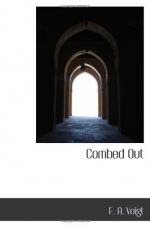The rapidity with which the time passed was terrifying. Although my leave had produced so much disillusionment, I yet dreaded its termination. Just as my life at the front had made me unfit for life at home, so my short spell of life at home had rendered me unfit for further life at the front. Moreover, I knew that my concrete experiences had done a little towards strengthening and confirming the attitude of my few friends, a consideration that gave me some satisfaction. I thought that in time I might get into touch with other people who shared our attitude and then take part in some anti-war movement and fight against the war instead of in it. That would have been the only activity to which I could have devoted myself with energy and enthusiasm. But I would soon have to go back and be muzzled once more by a ruthless discipline and an all-embracing censorship. Moreover, as my leave approached its end I began to regret that I had not striven harder to enjoy the comforts and freedom of civilian life. The dread of the coming return to slavery and dreary routine began to outweigh every other consideration. The prospect of living in a tent crowded with foul-mouthed, noisy soldiers filled me with dismay. I made a feeble attempt at securing an extension of my leave, but failed, and then I resigned myself to my fate.
One afternoon, towards the end of the fortnight, I went to Kew Gardens with my friend.
The softness of the warm September day, the calm trees, and the flowers that were pure untroubled beauty (how I envied them their dispassionate lives, their tranquil growth, their effortless attainment of perfection, and their unconscious dying!)—all these had a strangely harmonizing influence upon my discordant spirit. We spoke little, and of the war not at all. Indeed, the war suddenly seemed curiously remote and I could hardly hear the throbbing of the guns. I knew that this afternoon would never be lost, that I would often think of it when back at the front. It would remain a dream of tranquil beauty that would haunt me at unexpected moments. I felt that for this alone my leave had been worth while.
The last morning came. I made a successful effort to control myself. I said good-bye. It was all over.
* * * * *
When I got back to camp all the men were out at work. I sat down alone in my tent. I felt slightly dazed, but not as miserable as I had expected to feel. I did not know how to occupy my time. I had brought several books with me, but I felt no inclination to read. Life seemed empty and purposeless. I waited impatiently for the return of the others.
They arrived and the evening passed quickly in talk. My friend, whose place was next to mine, remarked that I was far more cheerful than men returning from leave usually are.
The next day and many days after I was unable to shake off the feeling of mental torpor and a vague regret for what had been and what had gone for ever. My leave seemed like a thing I had dreamt of long ago. Sometimes I asked myself in a puzzled manner: “Have I really been home on leave?”




